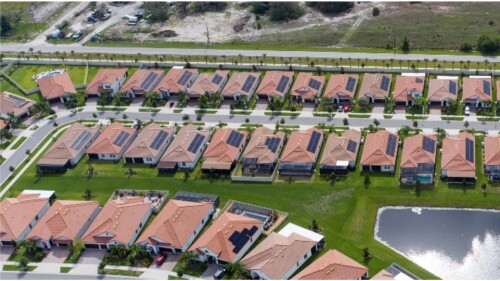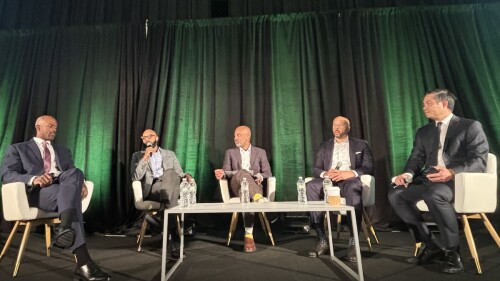The expansion of the U.S. economy is expected to continue over the next three years, but with growth moderating by 2021, according to the 15th annual ULI Real Estate Economic Forecast covering 27 economic and real estate indicators.
Among the highlights of the survey based on the median forecasts from 45 economists/analysts at 33 major real estate investment, advisory, and research firms and organizations and released during ULI’s Spring Meeting:
- Commercial real estate prices are projected to grow more slowly, from 5 percent in 2019 to 3.7 percent in 2020 and 2.8 percent in 2021.
- Transaction volume, which reached $562 billion last year, is forecast to moderate to $535 billion in 2019 by $480 billion in 2021.
- Single‐family housing starts are projected to increase to 900,000 in 2019 (up from 870,600 units in 2018) before falling to 850,000 units in 2021.
The forecast will also be discussed on a ULI webinar on May 1. ULI members may now view the report and learn more about the session that took place at the 2019 Spring Meeting in Knowledge Finder.
Mark Wilsmann, head of equity strategies for Whippany, New Jersey–based MetLife Investment Management’s (MIM) Real Estate group, which manages more than $25 billion in assets, moderated the panel and asked the more than 400 attendees if they thought the results were too optimistic, just right, or not optimistic enough. By a show of hands, about 80 percent of the audience said the results were ‘just right.’
Panelists included Ken Rosen, chairman of the Berkeley Haas Fisher Center for Real Estate and Urban Economics; Dave Bragg, managing director of strategic research at Newport Beach, California–based Green Street Advisors; and Mary K. Ludgin, senior managing director and head of global research at Chicago-based Heitman, a global real estate management firm.
Panelists also raised concern over U.S. Federal Reserve policies and discussed the likely timing of the next recession.
Rosen noted that the Fed was on track to raise interest rates last December but did a 180-degree turn one month later. “The Fed got nervous and I don’t think it had anything to do with [U.S. President Donald J.] Trump,” he said. “The global economy weakened, and the Fed changed its mind. The trade war is responsible for some of the economic weakening.”
While not predicting the date of a recession, Rosen said the risk of a recession remains. “There has been too much money out there with too low rates for too long,” he said. “I don’t think real estate will cause the next recession, but we will be affected. But the Fed doesn’t know any more than the people in this room—and they may know less.”
He complained that current Fed Chairman Jerome “Jay” Powell is not a good communicator. “Alan Greenspan [who served five terms as chairman of the Board of Governors of the Federal Reserve beginning in 1987) was our best guy, because you never knew what he was saying and that was perfect!”
As long as consumers don’t get spooked, Ludgin said she believes any U. S. economic recession is on “hold” for now. “The possibility of a recession is out there for a number of factors including China’s slowing economy—not related to the tariffs but its shift to domestic model is going ‘shakily.’” she said. Real estate will not cause the next recession, Ludgin said. “It’s not going to be ‘our’ recession. We helped cause the 1990–91 recession, but not the other three.”
Bubbles also could adversely affect the U.S. and global economies, such as the Bitcoin bubble last year and the unicorn bubble [an economic bubble that occurs when unicorn startup companies are overvalued by venture capitalists] currently. “China has built huge amounts of residential that is not occupied,” Rosen said.
Wilsmann asked the panel about cities or sectors to invest in or to avoid.
“In retail, you’ve got to play the long game, and a lot of people don’t have a stomach for that,” Ludgin said. “If you are long-term investor, do it now. Multifamily is overbuilt in some areas, particularly luxury apartments and including this town [Nashville]. And the industrial sector is going to disappoint at some point. The question is when.”
Bragg said that one of the least favorite places to invest now is the office sector in midtown Manhattan, particularly buildings that are 30 years old or older. “It’s going to be a dramatic shift because the Manhattan office tenant is demonstrating a desire for new product, like what is available in Hudson Yards,” he added.
The industrial sector continues to be attractive because industrial development can be stopped quickly, said Rosen. “The cost of redoing industrial is so small compared to office,” he added. “Multifamily, too, is interesting, particularly C class. There are a lot of people turning 18 in the years ahead.”
In considering investment opportunities, Bragg said that investors and developers must also reconsider what a “constrained market” is nowadays because things change. “New York City is not as supply constrained as it was years ago because former Mayor [Michael] Bloomberg rezoned 40 percent of the city,” he said.
The fiscal health of a market, as well as the location, is a concern, he added. “You have to also consider the outlook for taxes, for example,” he continued. “In California, a partial repeal of Prop 13 [which reduced property taxes] is expected to be on the ballot in 2020. What effect will that have on real estate?”
The Spring 2019 Real Estate Economic Forecast will be reviewed as part of a webinar on May 1st—ULI members can click here to register. The next semiannual survey release is scheduled for September. This and all other sessions at the 2019 Spring Meeting are now available for members in Knowledge Finder.




